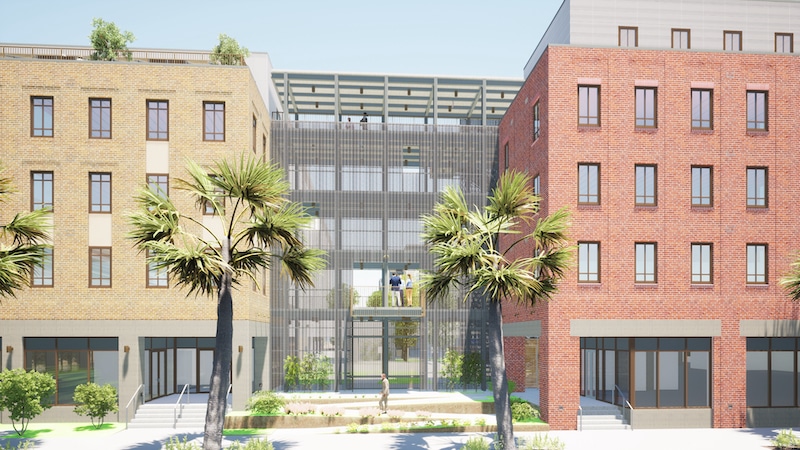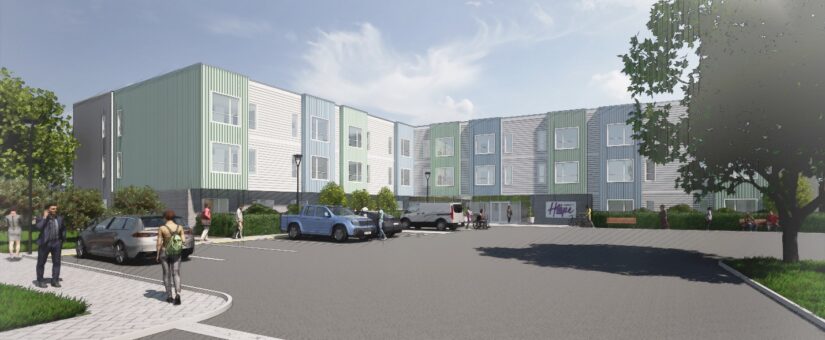Breaking Ground
Keli Savage, AVP, Head of Impact Investment Strategy, CVS Health

By Darryl Hicks
8 min read
In addition to being the largest drugstore chain in America, CVS Health has invested over $1.8 billion to create, preserve and renovate affordable housing since 1997 – over $1 billion of that amount in the last five years.

The person leading these efforts is Keli Savage, associate vice president and head of impact investment strategy for CVS Health, whose experience in real estate investing dates back more than 25-plus years.
Knowing much more is needed beyond housing to improve the health and well-being of residents and their neighborhoods, Savage’s team collaborates with vision-aligned public and private partners and harnesses CVS Health & Aetna, a CVS Health company, assets to bring a broad range of programs and services to communities to address various social determinants of health and promote health equity.
Before joining Aetna in 2014, she was an acquisitions officer for UBS Realty Investors where she facilitated closing equity and mortgage investments worth a combined total of more than $1.8 billion.
Tax Credit Advisor sat down with Savage to learn more about CVS Health’s activities and plans for the future.
Tax Credit Advisor: How long has CVS Health invested in affordable housing? What prompted the company to enter this market?
Keli Savage: CVS Health and Aetna have been investing in affordable housing since 1997. Our longstanding commitment to addressing housing insecurities in our communities is grounded in our purpose to bring our hearts to every moment of health. We recognize that equitable access to stable and supportive housing serves as one of the greatest barriers to better health for many people. Through our affordable housing investments and our work with local organizations to provide supportive services, we’re advancing health equity at the community level, helping people live healthier and creating positive change all around them.
TCA: Can you share some current numbers, including the size of your affordable housing portfolio, regions of the country you’re most active, and a breakdown of project type (i.e., senior housing vs. family housing)?
KS: In the past five years, CVS Health has made investments nationally to create, preserve and renovate more than 25,000 affordable rental units, including 16,400 for families and 6,300 for seniors. In addition, these investments have helped create nearly 2,500 permanent supportive housing units for veterans, LGBTQ+ individuals in need of support, those experiencing homelessness, single-parent households, survivors of domestic violence, youth aging out of foster care, those with physical, intellectual and/or developmental disabilities, those in need of mental health or substance abuse support, Second Chance participants, survivors of human trafficking and other groups that may be facing challenges in their lives.
TCA: What is CVS’ primary role? Do you provide debt financing, invest in Low Income Housing Tax Credits or a little of both?
KS: CVS Health primarily invests in affordable housing through the LIHTC program, which the Department of Housing and Urban Development describes as “the most important resource for creating affordable housing in the United States today.” We know housing is healthcare and our investments enable individuals and families to free up more of their income to focus on their health and well-being.
TCA: As a major healthcare provider, I imagine you also provide services to help improve renters’ health and well-being. What can you share about that?
KS: We look to partner with vision-aligned developers and service providers who understand housing is healthcare, and the first step to improving an individual’s health and well-being is to have access to quality, safe, affordable housing. We also know much more is needed beyond housing. We strive towards a holistic approach to advancing health equity for residents and communities through internal programs and services, as well as strategic collaborations with community-based organizations. For example, CVS Health’s workforce initiative programs, which focus on empowerment, education and training, create pathways to employment in more than 1,150 communities across the U.S. in collaboration with federal, state and local agencies, nonprofit, faith-based and career development organizations. Our Career Skills Labs include mock front-store and pharmacy environments that provide experiential learning opportunities for partners and program participants, as well as space for call center training and logistics. Our Workforce Innovation and Talent Centers go beyond training and employment and in collaboration with local organizations help provide food and necessities, access to healthcare, transportation, childcare and other supportive services. We also continue to expand the reach of our Project Health program in cities across the country, giving residents greater access to healthcare services. Project Health offers free biometric screenings onsite at affordable housing communities to help identify chronic conditions before they become life-threatening illnesses. Additionally, our philanthropic strategy prioritizes collaboration with community-centered programs and supports initiatives that address the disparities in health-related social needs and improve overall health and outcomes for affordable housing and other community residents.

TCA: What types of projects do you find most appealing? How do you identify potential new projects? Do you work with particular developers who identify projects and invite you into the deal, or are you involved in the deal selection process?
KS: Affordable housing is such a huge need across the U.S., and it is incredibly important to not only build more but to preserve and renovate existing communities. The most appealing opportunities include those that will do the most to advance health equity and uplift the residents and the community with developers who clearly understand “housing is healthcare.” We look for rehabilitations to thoughtfully and substantially improve the health and well-being of residents. We look for new developments to be innovative, well-built and designed to meet the needs of future residents. We also ensure appropriate services, as determined through collaborative conversations with current and future residents, will be provided. Opportunities present themselves in various ways, including through our syndicator and existing developer relationships, our reviews of LIHTC applications and awards, and our emerging relationships with passionate, vision-aligned developers.

TCA: The Centers for Medicare & Medicaid Services (CMS) recently indicated that it will permit states to use Section 1115 Medicaid Demonstration Waivers for health-related social needs in affordable housing projects. What impact do you see this having on the affordable housing space?
KS: I am hopeful this may lead to further collaboration with developers, investors, service providers, governmental agencies and others to address the housing crisis so deeply impacting communities across the U.S. The country needs sustainable solutions to keep individuals and families properly housed and supported.
TCA: Are there any important issues or trends that you’re seeing in the marketplace that you’d like to share with our readers?
KS: I believe states will continue to evaluate their qualified allocation plans and increase incentives for developers to include health priorities in their development and rehabilitation opportunities. I envision a greater collaboration of payors and providers to evaluate at scale the significant positive impacts of affordable housing with supportive services on individual and community health and well-being.
TCA: Is there a specific housing project that is near and dear to your heart that you’d like to highlight?
KS: I am fortunate to work with vison-aligned developers and partners across the country, and here are just a few examples:

- With a nod toward abolitionist Harriet Tubman, Harriet’s Hope is a first-of-its-kind development in Ohio providing 52 permanent supportive units for survivors of human trafficking. Built by Beacon 360 and Columbus Metropolitan Housing Authority, Harriet’s Hope residents receive a holistic and trauma-informed approach to service delivery; including on-site behavioral, mental and physical health services in collaboration with local providers and peer support groups to encourage rehabilitation and self-sufficiency.
- In New Orleans, H3C includes 192 units of affordable housing for families and older adults, as well as a new community health clinic onsite providing adult and pediatric medical and behavioral healthcare services, an on-site pharmacy and Medicaid enrollment assistance; and
- Cuyahoga TAY in Cleveland is 50 units of permanent supportive housing currently under construction for transition-age youth (18 to 24 years old) facing housing instability or homelessness. Young people shared insights to inform the need for, creation and design of the development, and are serving as collaborators throughout the building and service design processes. Services may include physical and mental health care, employment and education support, conflict and family mediation and other services to help residents maintain stable housing and move successfully into the future.